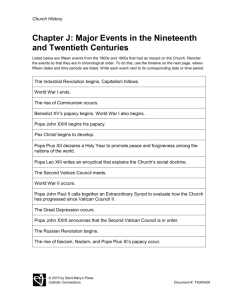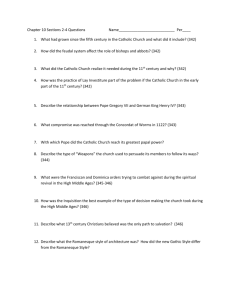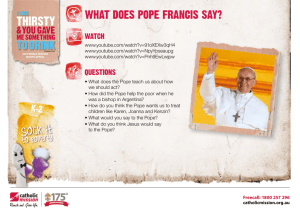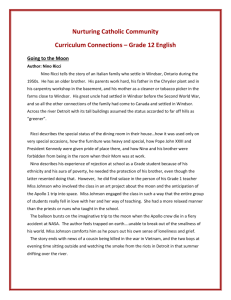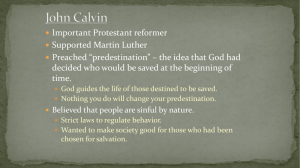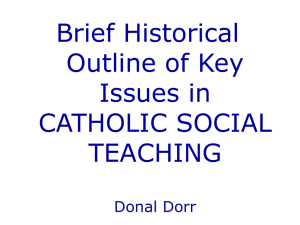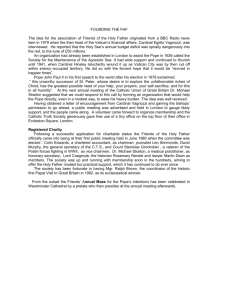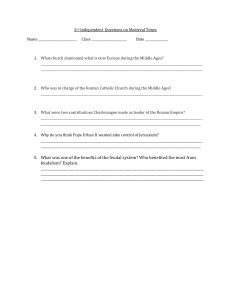Reading the signs of the times
advertisement
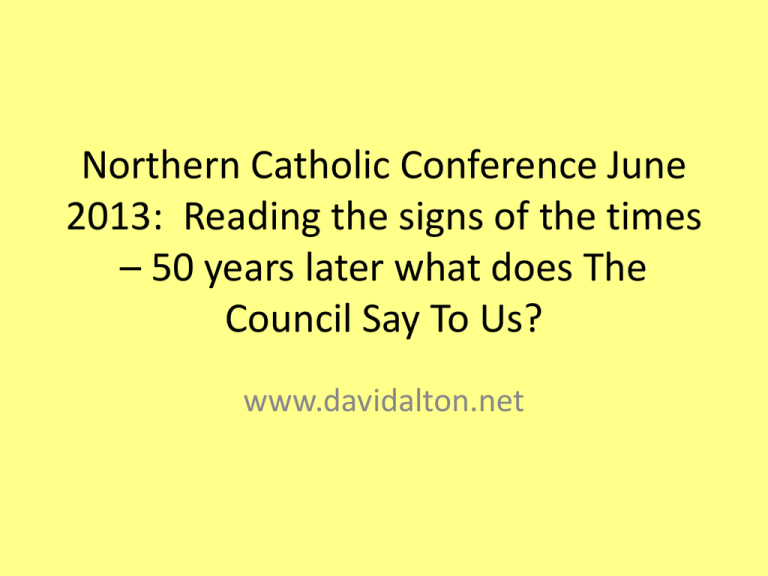
Northern Catholic Conference June 2013: Reading the signs of the times – 50 years later what does The Council Say To Us? www.davidalton.net On October 11th 2012, we marked the momentous event which has defined contemporary Catholic Christianity – the official opening, by Pope John XXIII of the Second Vatican Council. The Council fathers were invited to read the signs of the times and to respond accordingly. Commentators called it a time on metanoia – meaning a transformative change of heart; a time for spiritual conversion; a time when the windows of the Vatican would be thrown open and the Holy Spirit invited in. Above all it was to be a time for renewal “a new Pentecost.” Perhaps it is also worth recording two things from recent reports: first, that an estimated 100,000 people die for their Christian faith each year and, second, that at a time when it is fashionable to attack the Church for its failings, we might just reflect for a moment on the extraordinary outpouring of good for which the Church is responsible: without any distinction of religion or race. Worldwide, the Church runs 70,544 kindergartens with 6,478,627 pupils; 92,847 primary schools with 31,151,170 pupils; 43,591 secondary schools with 17,793,559 pupils. She educates 2,304,171 high school pupils, and 3,338,455 university students. The Church’s worldwide charity and healthcare centres include: 5,305 hospitals; 18,179 dispensaries; 547 Care Homes for people with Leprosy; 17,223 Homes for the elderly, or the chronically ill or people with a disability; 9,882 orphanages; 11,379 crèches; 15,327 marriage counseling; 34,331 social rehabilitation centres and 9,391 other kinds of charitable institutions. In addition, consider its work in establishing hospices for the terminally ill and dying, it shelters for the homeless, and its work in refugee camps, among internally displaced people and with the poor. That we fail, both personally and institutionally, is self evident – and it was ever thus - but occasionally we should recall the lives that have been laid down for the religious freedoms we enjoy today and the lives which continued to be given in sacrifice or service. If a faith is worth dying for it is worth living for – and these examples of sacrifice and self giving should inspire and animate us all. That call to give generously of ourselves - and to share our belief and love of God and the man made in his image - was at the heart of the teaching of the Second Vatican Council. October 12th 1962 Pope John XXIII Cardinal Newman – the missing Cardinal • The Second Spring Sermon began with The Song of Solomon: • Arise, make haste, my love, my dove, my beautiful one, and come. For the winter is now past, the rain is over and gone. The flowers have appeared in our land.” • Have we any right to take it strange, if, in this English land, the spring-time of the Church should turn out to be an English spring, an uncertain, anxious time of hope and fear, of joy and suffering,–of bright promise and budding hopes, yet withal, of keen blasts, and cold showers, and sudden storms? Blessed John Henry Newman “To suppose that all beliefs are equally true in the eyes of God, provided they are all sincerely held, is simply unreal and a mere dream of reason.” He argued that we would come to venerate spirituality or religion rather than Christ and that “in this way religion is made to consist in contemplating ourselves instead of Christ.” … heresy to state that “any creed is as good as any other. The lie teaches that all religious declarations are equally worthy because they are no more than matters of personal opinion.” Newman’s belief in the truth of the central Christian creeds, his belief in the teaching authority of the Pope, and his desire that each person should embrace their duty to share their beliefs and to act on them in a way that would benefit society as a whole, should be central to our understanding of the theology of the Second Vatican Council – Newman’s Council – and to Pope Benedict’s decision to beatify him and to come to Birmingham to do it. Pope Francis is a natural successor to John XXIII Lumen Gentium Lumen Gentium, the dogmatic constitution of the Church, defined the role of Pontiff as integrating the pope’s power of primacy with the power of the college of bishops – an issue to which Pope Francis may well return, especially in the light of his decision to repeatedly use the title of Bishop of Rome rather than that of Pope when describing himself. Pope Francis “The Catholic Church is aware of the importance of the promotion of friendship and respect between men and women of different religious traditions. I want to repeat this: The promotion of friendship and respect between men and women of different religious traditions.” Soon after his election as Pope, Francis sent a message to Riccardo Di Segni, the Chief Rabbi of Rome, pledging a spirit of “renewed collaboration.” Rabbi Di Segni attended the Vatican meeting and praised the new Pope’s outreach. 1962 John XXIII’s convening of the Council was a time of great hope for the Church but this was not mirrored in the secular world, where it was a tense time – defined by the Cuban Missile Crisis and the stand-off between Presidents J.F.Kennedy and Nikita Kruschev. The crisis was at its height and the US was carrying out nuclear tests at Johnston Island and in Nevada. The simmering Cold War conflict was being fought out in the open in proxy wars, civil wars, and revolutions, aided and abetted by the super powers. 1962 1962: a time for aggiornamento John XXIII frequently said that it was time to throw open the windows of the Church in order to let in some fresh air: a time for aggiornamento – a bringing-up-to-date. He argued that the Church must “ keep up to date with the changing conditions of this modern world, and of modern living, for these have opened up entirely new avenues for the Catholic apostolate.” He said it was a time to address “ the errors, needs and opportunities of our day” and that the key purpose of calling the Council was “that the sacred heritage of Christian truth be safeguarded and expounded with greater efficacy. “ “The Bishop must be distinguished by his own understanding, and his adequate explanation to others, of the philosophy of history, even the history that is now, before our eyes, adding pages of blood to pages of political and social disorders.” On October 11th, 1962, in his opening address, Pope John began by reminding those gathered that “the Church must once more reaffirm that teaching authority of hers which never fails, but will endure until the end of time. For that was Our reason for calling this most authoritative assembly, and We address you now as the humble successor, the latest born, of this Prince of Apostles. “ He said that the choice for the world was “to be with Christ or against Him” and that the decision to separate ourselves from Christ results in “confusion, bitterness in their relations with one another, and the savage threat of war.” The Council had been called, he said, “to diffuse the light of truth; to give right guidance to men both as individuals and as members of a family and a society; to evoke and strengthen their spiritual resources; and to set their minds continually on those higher values which are genuine and unfailing” and his hope was that the Church would be given “spiritual enrichment” He expressed anxiety about those pessimists who “ can see nothing but calamity and disaster in the present state of the world. They say over and over that this modern age of ours, in comparison with past ages, is definitely deteriorating. One would think from their attitude that history, that great teacher of life, had taught them nothing. They seem to imagine that in the days of the earlier councils everything was as it should be so far as doctrine and morality and the Church's rightful liberty were concerned. “ “We feel that we must disagree with these prophets of doom, who are always forecasting worse disasters, as though the end of the world were at hand. “ In stating that there was “a basis for optimism” he contrasted the freedom in which the Second Vatican Council was meeting with earlier times whilst not neglecting to mention those bishops who were missing from the Council’s deliberations: “They suffer imprisonment and every kind of disability because of their faith in Christ.” His opening address reminded the church that Catholics must contribute to society; that it must not fear science but always temper it with appropriate ethics; that it must bring home the Church’s teaching to the modern world; uphold and transmit truth fearlessly: “Our duty is not just to guard this treasure, as though it were some museum-piece and we the curators, but earnestly and fearlessly to dedicate ourselves to the work that needs to be done in this modern age of ours, pursuing the path which the Church has followed for almost twenty centuries.” He called for “a fresh approach” for the Council fathers to “blaze a trail” and to expound the truths held by the church “in a manner more consistent with a predominantly pastoral view of the Church's teaching office.” This he says, will be “a radiant dawn”… For with the opening of this Council a new day is dawning on the Church, bathing her in radiant splendour. It is yet the dawn, but the sun in its rising has already set our hearts aglow.” The Church In Council A positive proof of the Catholic Church's vitality is furnished by every single council held in the long course of the centuries—by the twenty ecumenical councils as well as by the many thousands of memorable regional and provincial ones emblazoned on the scroll of history. A History Of Triumph We address you, therefore, as Christ's vicar, and We naturally begin this General Council by setting it in its historical context. The voice of the past is both spirited and heartening. We remember with joy those early popes and their more recent successors to whom we owe so much. Their hallowed, momentous words come down to us through the councils held in both the East and the West, from the fourth century to the Middle Ages, and right down to modern times And Of Adversity Here is cause indeed for spiritual joy. And yet this history has its darker side too, a fact, which cannot be glossed over. These nineteen hundred years have reaped their harvest of sorrow and bitterness. To Be With Christ Or Against Him Certain it is that the critical issues, the thorny problems that wait upon men's solution, have remained the same for almost twenty centuries. And why? Because the whole of history and of life hinges on the person of Jesus Christ. Either men anchor themselves on Him and His Church, and thus enjoy the blessings of light and joy, right order and peace; or they live their lives apart from Him; many positively oppose Him, and deliberately exclude themselves from the Church. The result can only be confusion in their lives, bitterness in their relations with one another, and the savage threat of war. A Pastoral Function But the function of every ecumenical council has always been to make a solemn proclamation of the union that exists between Christ and His Church; to diffuse the light of truth; to give right guidance to men both as individuals and as members of a family and a society; to evoke and strengthen their spiritual resources; and to set their minds continually on those higher values which are genuine and unfailing. The Decision To Hold The Second Vatican Council A Sudden Inspiration As regards the immediate cause for this great event, which gathers you here together at Our bidding, it is sufficient for Us to put on record once more something which, though trifling in itself, made a deep impression on Us personally. The decision to hold an ecumenical council came to Us in the first instance in a sudden flash of inspiration. We communicated this decision, without elaboration, to the Sacred College of Cardinals on that memorable January 25, 1959, the feast of Saint Paul's Conversion, in his patriarchal basilica in the Ostien Way. The response was immediate. It was as though some ray of supernatural light had entered the minds of all present: it was reflected in their faces; it shone from their eyes. At once the world was swept by a wave of enthusiasm, and men everywhere began to wait eagerly for the celebration of this Council. Arduous Preparation For three years the arduous work of preparation continued. It consisted in making a detailed and accurate analysis of the prevailing condition of the faith, the religious practice, and the vitality of the Christian, and particularly the Catholic, body. We are convinced that the time spent in preparing for this Ecumenical Council was in itself an initial token of grace, a gift from heaven. Hope For Spiritual Enrichment For We have every confidence that the Church, in the light of this Council, will gain in spiritual riches. New sources of energy will be opened to her, enabling her to face the future without fear. By introducing timely changes and a prudent system of mutual cooperation, We intend that the Church shall really succeed in bringing men, families and nations to the appreciation of supernatural values. The Timing Of This Council And now, venerable brethren, there is another point that We would have you consider. Quite apart from the spiritual joy we all feel at this solemn moment of history, the very circumstances in which this Council is opening are supremely propitious. May We go on record as expressing this conviction openly before you now in full assembly. Pessimistic Voices In the daily exercise of Our pastoral office, it sometimes happens that We hear certain opinions which disturb Us—opinions expressed by people who, though fired with a commendable zeal for religion, are lacking in sufficient prudence and judgment in their evaluation of events. They can see nothing but calamity and disaster in the present state of the world. They say over and over that this modern age of ours, in comparison with past ages, is definitely deteriorating. One would think from their attitude that history, that great teacher of life, had taught them nothing. They seem to imagine that in the days of the earlier councils everything was as it should be so far as doctrine and morality and the Church's rightful liberty were concerned. We feel that We must disagree with these prophets of doom, who are always forecasting worse disasters, as though the end of the world were at hand. A Basis For Optimism Present indications are that the human family is on the threshold of a new era. We must recognize here the hand of God, who, as the years roll by, is ever directing men's efforts, whether they realize it or not, towards the fulfillment of the inscrutable designs of His providence, wisely arranging everything, even adverse human fortune, for the Church's good. Civil Intervention Eliminated As a simple example of what We mean, consider the extremely critical problems which exist today in the political and economic spheres. Men are so worried by these things that they give scant thought to those religious concerns, which are the province of the Church's teaching authority. All this is evil, and we are right to condemn it. But this new state of affairs has at least one undeniable advantage: it has eliminated the innumerable obstacles erected by worldly men to impede the Church's freedom of action. Earnest Prayer For Absent Bishops We must indeed confess to you Our deep sorrow over the fact that so many bishops are missing today from your midst. They suffer imprisonment and every kind of disability because of their faith in Christ. The thought of these dear brothers of Ours impels Us to pray for them with great earnestness. Yet We are not without hope; and We have the immense consolation of knowing that the Church, freed at last from the worldly fetters that trammelled her in past ages, can through you raise her majestic and solemn voice from this Vatican Basilica, as from a second Apostolic Cenacle. The Council’s Principal Duty: The Defence And Advancement Of Truth The major interest of the Ecumenical Council is this: that the sacred heritage of Christian truth be safeguarded and expounded with greater efficacy. That doctrine embraces the whole man, body and soul. It bids us live as pilgrims here on earth, as we journey onwards towards our heavenly homeland. Man's Twofold Obligation It demonstrates how we must conduct this mortal life of ours. If we are to achieve God's purpose in our regard we have a twofold obligation: as citizens of earth, and as citizens of heaven. That is to say, all men without exception, both individually and in society, have a life-long obligation to strive after heavenly values through the right use of the things of this earth. These temporal goods must be used in such a way as not to jeopardize eternal happiness. Seeking The Kingdom Of God True enough, Christ our Lord said: "Seek first the kingdom of God and His justice,“ and this word "first" indicates what the primary direction of all our thoughts and energies must be. Nevertheless, we must not forget the rest of Our Lord's injunction: "and all these things shall be given you besides.“ Thus the traditional as well as the contemporary Christian approach to life is to strive with all zeal for evangelical perfection, and at the same time to contribute toward the material good of humanity. It is from the living example and the charitable enterprise of such Christians as these that all that is highest and noblest in human society takes its strength and growth. Contributing To Society If this doctrine is to make its impact on the various spheres of human activity—in private, family and social life—then it is absolutely vital that the Church shall never for an instant lose sight of that sacred patrimony of truth inherited from the Fathers. But it is equally necessary for her to keep up to date with the changing conditions of this modern world, and of modern living, for these have opened up entirely new avenues for the Catholic apostolate. Beyond Science The Church has never been stinting in her admiration for the results of man's inventive genius and scientific progress, which have so revolutionized modern living. But neither has she been backward in assessing these new developments at their true value. While keeping a watchful eye on these things, she has constantly exhorted men to look beyond such visible phenomena—to God, the source of all wisdom and beauty. Her constant fear has been that man, who was commanded to "subject the earth and rule it,“ should in the process forget that other serious command: "The Lord thy God shalt thou worship, and Him only shalt thou serve." 8 Real progress must not be impeded by a passing infatuation for transient things. Bringing Home The Church’s Teaching To The Modern World From what We have said, the doctrinal role of this present Council is sufficiently clear. Transmitting The Truth Fearlessly This twenty-first Ecumenical Council can draw upon the most effective and valued assistance of experts in every branch of sacred science, in the practical sphere of the apostolate, and in administration. Its intention is to give to the world the whole of that doctrine which, notwithstanding every difficulty and contradiction, has become the common heritage of mankind—to transmit it in all its purity, undiluted, undistorted. It is a treasure of incalculable worth, not indeed coveted by all, but available to all men of good will. And our duty is not just to guard this treasure, as though it were some museum-piece and we the curators, but earnestly and fearlessly to dedicate ourselves to the work that needs to be done in this modern age of ours, pursuing the path which the Church has followed for almost twenty centuries. Nor are we here primarily to discuss certain fundamentals of Catholic doctrine, or to restate in greater detail the traditional teaching of the Fathers and of early and more recent theologians. We presume that these things are sufficiently well known and familiar to you all. A Fresh Approach There was no need to call a council merely to hold discussions of that nature. What is needed at the present time is a new enthusiasm, a new joy and serenity of mind in the unreserved acceptance by all of the entire Christian faith, without forfeiting accuracy and precision … What is needed, and what everyone imbued with a truly Christian, Catholic and apostolic spirit craves today, is that this doctrine shall be more widely known, more deeply understood, and more penetrating in its effects on men's moral lives. … …time-honoured teaching is one thing; the manner in which these truths are set forth (with their meaning preserved intact) is something else. This, then, is what will require our careful, and perhaps too our patient, consideration. We must work out ways and means of expounding these truths in a manner more consistent with a predominantly pastoral view of the Church's teaching office. The Right Way To Suppress Error In these days, which mark the beginning of this Second Vatican Council, it is more obvious than ever before that the Lord's truth is indeed eternal. Human ideologies change. Successive generations give rise to varying errors, and these often vanish as quickly as they came, like mist before the sun. Contemporary Repudiation Of Godlessness …our contemporaries show every inclination to …repudiate God and His law, and which places excessive confidence in technical progress and an exclusively material prosperity. It is more and more widely understood that personal dignity and true self-realization are of vital importance and worth every effort to achieve. More important still, experience has at long last taught men that physical violence, armed might, and political domination are no help at all in providing a happy solution to the serious problems which affect them. A Loving Mother The great desire, therefore, of the Catholic Church in raising aloft at this Council the torch of truth, is to show herself to the world as the loving mother of all mankind; gentle, patient, and full of tenderness and sympathy for her separated children. Promoting Unity Of The Christian And Human Family …Unhappily, however, the entire Christian family has not as yet fully and perfectly attained to this visible unity in the truth. But the Catholic Church considers it her duty to work actively for the fulfilment of that great mystery of unity for which Christ prayed so earnestly to His heavenly Father on the eve of His great sacrifice. Reflection Of That Unity Sought By Christ Indeed, if we consider well the unity for which Christ prayed on behalf of His Church, it would seem to shine, as it were, with a threefold ray of supernatural, saving light. There is first of all that unity of Catholics among themselves which must always be kept steadfast and exemplary. There is also a unity of prayer and ardent longing prompting Christians separated from this Apostolic See to aspire to union with us. And finally there is a unity, which consists in the esteem and respect shown for the Catholic Church by members of various non-Christian religions. Universality And Unity It is therefore an overwhelming source of grief to us to know that, although Christ's blood has redeemed every man that is born into this world, there is still a great part of the human race that does not share in those sources of supernatural grace, which exist in the Catholic Church. And yet the Church sheds her light everywhere. Blazing A Trail Such, venerable brethren, is the aim of the Second Vatican Council. It musters the Church's best energies and studies with all earnestness how to have the message of salvation more readily welcomed by men. By that very fact it blazes a trail that leads toward that unity of the human race, which is so necessary if this earthly realm of ours is to conform to the realm of heaven, "whose king is truth, whose law is love, whose duration is eternity Conclusion Thus, venerable brethren in the episcopate, "our heart is wide open to you.“ Here we are assembled in this Vatican Basilica at a turning-point in the history of the Church; here at this meeting-place of earth and heaven, by Saint Peter's tomb and the tomb of so many of Our predecessors, whose ashes in this solemn hour seem to thrill in mystic exultation. A Radiant Dawn For with the opening of this Council a new day is dawning on the Church, bathing her in radiant splendour. It is yet the dawn, but the sun in its rising has already set our hearts aglow. All around is the fragrance of holiness and joy. Yet there are stars to be seen in this temple, enhancing its magnificence with their brightness. You are those stars, as witness the Apostle John; the churches you represent are golden candlesticks shining round the tomb of the Prince of Apostles. With you We see other dignitaries come to Rome from the five continents to represent their various nations. Their attitude is one of respect and warm-hearted expectation. Saints, Faithful, And Council Fathers God grant that your zeal and your labours may abundantly fulfil these aspirations. The eyes of the world are upon you; and all its hopes. Prayer For Divine Assistance Almighty God, we have no confidence in our own strength; all our trust is in you. Graciously look down on these Pastors of your Church. Aid their counsels and their legislation with the light of your divine grace. Be pleased to hear the prayers we offer you, united in faith, in voice, in mind. Mary, help of Christians, help of bishops… Prosper now this work of ours, and by your kindly aid bring it to a happy, successful conclusion. And do you, with Saint Joseph your spouse, the holy apostles Peter and Paul, Saint John the Baptist and Saint John the Evangelist, intercede for us before the throne of God. To Jesus Christ, our most loving Redeemer, the immortal King of all peoples and all ages, be love, power and glory for ever and ever. Amen The Council promulgated Four Constitutions: •Dei Verbum (Dogmatic Constitution on Divine Revelation) •Lumen Gentium (Dogmatic Constitution on the Church) •Gaudium et Spes (Pastoral Constitution on the Church in the Modern World) •Sacrosanctum Concilium (Constitution on the Sacred Liturgy) Nine decrees: •Ad Gentes (Decree on the Church's Missionary Activity) •Apostolicam Actuositatem (Decree on the Apostolate of the Laity) •Christus Dominus (Decree on the Pastoral Office of Bishops in the Church) •Inter Mirifica (Decree on the Means of Social Communication) •Optatam Totius (Decree on the Training of Priests) •Orientalium Ecclesiarum (Decree on the Catholic Oriental Churches) •Perfectae Caritatis (Decree on the Up-to-date Renewal of Religious Life) •Presbyterorum Ordinis (Decree on the Life and Ministry of Priests) •Unitatis Redintegratio (Decree on Ecumenism) Three declarations: •Dignitatis Humanae (Declaration on Religious Liberty) •Gravissimum Educationis (Declaration on Christian Education) •Nostra Aetate (Declaration on the Church's Relations with Non-Christian To be Catholic is to be global. The word means "according to the whole", and in every generation the Church's adherents have sacrificed their lives to live out the Great Commission from Jesus to go out to all the nations of the world and to baptise all people in the name of the Father, Son and Holy Spirit (Matthew: 28, 16-20). Worldwide there are two billion Christians; 1.2 billion Catholics. The onus is universal - it applies to all those who accept Him - and it expected to be lived out universally: "all nations". Just before Easter 2013 in Burma where, the day before, Buddhists had attacked an Islamic village school. For 200 years they had lives alongside one another in peace. the day before Headlines from recent newspaper reports… The Silent Exodus of Syria’s Christians Islamic Law Comes to Rebel-Held Syria and the establishment of Sharia courts •Christians slaughtered – the world yawns. •Sudanese Officials Bulldoze Christian Church •Nigerian Priest: Boko Haram Destroyed 50 Churches •Tanzania : Christians Threatened with Islamist Violence on Easter East Asia and the Pacific •Chinese Activist, Now in U.S., Says His Relatives Remain Under Surveillance, Tells His Story of Abuse and Brutal Torture •Beijing Cautions New Pope on Meddling in China •Indonesian Officials Destroy Church in Front of Worshippers as Muslims Egg Them On •Three International NGOs Protest Legal Harassment of Buddhist Youth leader Le Cong Cau •Over 100 Buddhist monks burn them selves to death in self immolations. •Muslim Group Condemns Violence in Burma •House Church in Xinjiang Raided and Leaders Interrogated Persecution Rises in China as Plan Begins to End House Churches •China Rights group lists 2012’s Top 10 Cases of Anti-Christian Persecution •MALAYSIA: Ibrahim Ali, The Head of Perkasa, Issues Appeal to Burn Bibles •Two North Korean Christians Killed for Their Faith •Vietnam’s New Religion Decree Restrictive •Vietnamese Authorities Tear Down Carmelite Monastery •Indonesia Man Receives 5 Year Sentence for Insulting Islam •Azerbaijan Mosque Loses Eight-Year Struggle for Religious Freedom •Egypt’s Coptic Christians Must Be Protected From Sectarian Violence •We Abandon Christians in the East At Our Peril •Torture Likely Led to Death of Egyptian Christian in Libya, Sources Say •Iraq’s Endangered Christians •McMecca: The Strange Alliance of Clerics and Businessmen in Saudi Arabia •Only 57 Churches Left in Iraq •UN Special Rapporteur on Freedom of Religion or Belief Discusses New Report on Violence Against Baha’is in Iran •Iranian Pastor in Prison Needs Help of White House, Panel Told; Pastor’s Wife: “I am disappointed that the west has not fully engaged in this case. … I expect more from our government.” •St. Mark’s Coptic Church in Benghazi Torched •Outrage Spreads As Islam’s Most Holy Relics Are Being Demolished in Mecca •Copts Protest Church Attack in Egypt — Church Attacked Again •Egyptian Court Sentences Christian Family to 15 Years for Converting from Islam •Egypt’s Constitution Threatens Religious Freedom •In Libya, Two Religious Communities Forced Out •In Art and Education, Saudi Arabia Teaches Muslims Should “Triumph” Over Jews and Christians •Yemen’s Persecuted Christians •Sufi Mystics Warn of More Islamist Violence •Iran’s Religious Crackdown South and Central Asia •Pakistani Minorities See New Threats •Report: Kazakhstan Court Orders Burning of Religious Books, Possibly a First for Their Government •Appeal Sent by Catholic Congregations in Pakistan for Revision of Blasphemy Law •Almost 90 Killed in Attack Targeting Pakistan’s Shi’a Muslims •BANGLADESH: 20,000-strong mob attacks, Ahmadi festival •Violence Against Christians Spreading in India •Shiites Demand Protection •BRUTAL MURDER IN BALUCHISTAN: Christian Refuses to Convert to Islam •Kazakhstan’s authorities raid at least eight separate worship meetings The Second Vatican Council speaks audibly to a generation which even in a country like our own is witnessing heavy handed intolerance involving attempts to ban the saying of prayers on public occasions to the banning of the wearing of a cross; let alone the imprisonment and “reeducation” of Chinese Catholic bishops, like Shanghai’s Bishop Ma, and the execution of converts to Christianity in Iran. We think of the horrors of North Korea, of Nigeria, of Egypt, of Pakistan, of Syria, of Sudan and Iraq – and many other places. Wherever it occurs, this is the crushing of the human spirit. It also diminishes those who do it and robs society of something which can be virtuous and inspirational. Bishop Thaddeus Ma of Shanghai Strengthening religious freedom consolidates social bonds, nourishes the hope of a better world, creates favourable conditions for peace and harmonious development, while at the same time establishing solid foundations for securing the rights of future generations. there are those who wrongly interpret this search for the truth, leading them to irrationality and fanaticism; they close themselves up in ‘their truth,’ and try to impose it on others. These are like the blind scribes who, upon seeing Jesus beaten and bloody, cry out furiously, Crucify him! ( Jn 19:6). Anyone who acts irrationally cannot become a disciple of Jesus. Faith and reason are necessary and complementary in the pursuit of truth. God created man with an innate vocation to the truth and he gave him reason for this purpose. Certainly, it is not irrationality but rather the yearning for truth which the Christian faith promotes. This yearning for truth is the antithesis of homogenisation that implies a one size fits all vacuous western modernity to be imposed throughout the world. In Catholic thought, subsidiarity and universality sit happily alongside one another; so do reason and faith – the domains of secular rationality and religious conviction. These domains are interdependent and to be civilised we need them both. At the heart of all our concerns must remain the inalienable and inviolate dignity of the human person – which was a central theme of the document, Huamane Dignitatis and the encyclical Pacem In Terris – and which today we have experienced something close to aphasia. Let me close with some random thoughts of John XXIII but which tells us more of the wonderful insights of this good and holy man. Doubtless it will have been thoughts such as these which will have inspired our new Pope but they should inspire us too: A peaceful man does more good than a learned one. Pope John XXIII Anybody can be Pope; the proof of this is that I have become one. Pope John XXIII Born poor, but of honored and humble people, I am particularly proud to die poor. Pope John XXIII Consult not your fears but your hopes and your dreams. Think not about your frustrations, but about your unfulfilled potential. Concern yourself not with what you tried and failed in, but with what it is still possible for you to do. Pope John XXIII Every man has the right to life, to bodily integrity. Pope John XXIII I am able to follow my own death step by step. Now I move softly towards the end. Pope John XXIII I have looked into your eyes with my eyes. I have put my heart near your heart. Pope John XXIII It is easier for a father to have children than for children to have a real father. Pope John XXIII It is now for the Catholic Church to bend herself to her work with calmness and generosity. It is for you to observe her with renewed and friendly attention. Pope John XXIII It often happens that I wake up at night and begin to think about a serious problem and decide I must tell the Pope about it. Then I wake up completely and remember that I am the Pope. Pope John XXIII See everything, overlook a great deal, correct a little. Pope John XXIII The family is the first essential cell of human society. Pope John XXIII The feelings of my smallness and my nothingness always kept me good company. Pope John XXIII The true and solid peace of nations consists not in equality of arms, but in mutual trust alone. Pope John XXIII So John XIII was right when he proclaimed that “The council now beginning rises in the Church like the daybreak, a forerunner of most splendid light.” The question for us is whether we take its message into our own times. www.davidalton.net
